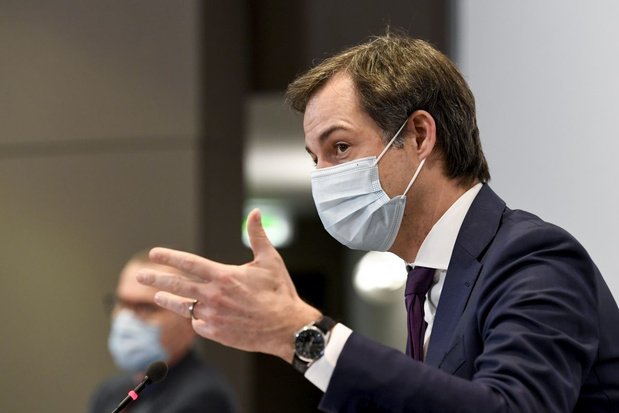Belgium has decided not to relax any measures yet in light of the rising figures, Prime Minister Alexander De Croo announced during a press conference on Friday.
The non-medical contact professions, such as beauticians, tattoo artists and massage salons, will still be allowed to reopen on Monday 1 March, as initially agreed.
"This afternoon, we did not make the decision we thought we would at the Consultative Committee. The situation remains extremely delicate," said De Croo. "After months of plateauing in the figures, we see that the number of new infections, and especially the number of new hospital admissions, is on the rise."
"That forces us to be particularly careful, especially in view of the variants that are a lot more infectious," he said. "When it's stormy, you can't take off. And with these figures you cannot relax, that would be imprudent."
"That is why the Consultative Committee has decided to take a kind of one-week time-out, during which we will keep our finger on the pulse," De Croo said. "I wish it were different, but this is to avoid making a decision at a time of uncertainty that would jeopardise everything we have achieved."
"I remain convinced that the moment of relaxations is not far off, but we will have to wait now," he said. "That is why we have chosen this time-out. This weighs on our minds and our mental capacity, I know."
"Additionally, I am fully aware that people are struggling, but this last hurdle together, we must take together," he said, referring to the 20,000 families who have lost a loved one, as well as young people who have no perspectives, and the people working in the hospitality and culture sectors.
A spring of freedom, where people can hold each other, is coming, stressed De Croo. "That is really not so far away anymore. But there is only one condition: be extra careful in the coming weeks. I would like to ask you personally: be extra careful. This is a delicate moment."
Related News
- Support measures for the self-employed extended until 30 June
- 'Time-out week': why Belgium is not relaxing measures yet
- Belgian hospitals asked to reserve 50% of intensive care beds for Covid-19 patients
"The fact that so many people end up in hospital is a sign of things to come, and we have to take it into account. We can only slow down the virus with our behaviour and by following the rules together," he said. "Together, we will make the spring of freedom possible."
Flemish Minister-President Jan Jambon stressed that he realises this is not the news that anyone wanted to hear today. "However, we cannot give up now, we have to keep going and persevere."
"The way out is clear, and the figures of the vaccinations in the residential care centres show that it is working," he said. "Hopefully, next week, we can decide on the relaxations that we had in mind for today."
As far as Wallonia is concerned, Minister-President Elio Di Rupo announced that the curfew measure will be aligned with the Flemish one, meaning that from 1 March, it will apply between midnight and 5:00 AM. The same will happen for the German-speaking Community, according to Oliver Paasch.
Across the Brussels-Capital Region, however, no rules will be changed, according to Minister-President Rudi Vervoort. "The curfew will remain in force from 10:00 PM to 6:00 AM across the Capital Region," he said.
"This virus continues to test our stamina and our unity," said Federal Health Minister Frank Vandenbroucke. "Fortunately, today we are united."
The number of Covid patients in intensive care has risen to 400, according to him. "According to previous agreements, we have asked hospitals to move to phase 1B and thus prepare for worse."
Additionally, Vandenbroucke urged people not to hesitate if they have complaints unrelated to Covid. "The most wrong decision is to postpone other necessary concerns. That has happened in recent months, but it should not happen now."
"Hospitals are safe and can handle non-Covid care as well. People should definitely go to the hospital if they have complaints or concerns, that's important," he stressed.
"If in doubt, please, do not hesitate to get tested," stressed De Croo. "Getting tested is a good way to keep yourself safe, but also to keep those around you safe."
Maïthé Chini
The Brussels Times

